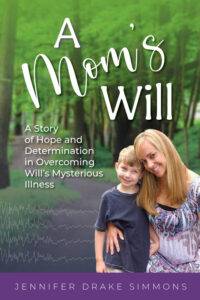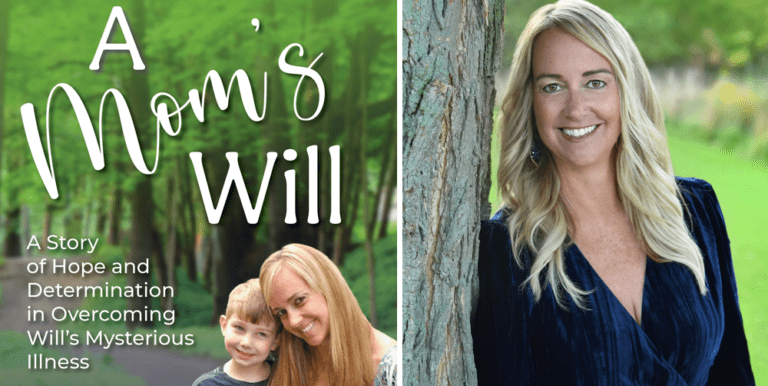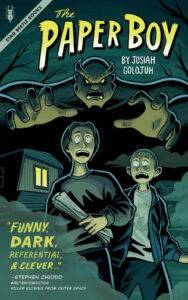From the Publisher: “When your child is hurting, all you want is for them to feel better…
Author Jennifer Drake Simmons spent years watching her son’s medical condition impact his life. On the roller coaster of getting better and getting worse, her family sought answers from medicine and nutrition, hoping for a way for Will to feel better and stop the ‘bad guys’ in his head from controlling his body.
Still, the seizures continued, and the family adapted, twisting and turning to follow the path his epilepsy took.
The toll on a child dealing with this is saddening, and that extends to the family. As Jennifer said, ‘Tears of fear and anxiety had worn a groove in my heart.’
Will’s journey may be unique, but every family who has dealt with this searches for answers, searches for hope.
A Mom’s Will is about the Simmons family’s journey, finding strength, trying new treatments, and eventually coming out of the storm.
Jennifer beautifully details their story, with the laughter and tears that ripple through medical quests, helping other families see that they too can find a way!
A portion of the proceeds from sales of this book go toward the Epilepsy Association.”
More info About the Author: Jennifer Drake Simmons isa devoted mom to sons Will and Blake and wife to her high school sweetheart, Brian. She graduated with honors from Virginia Tech where she received a B.S. innutrition and exercise science. Jennifer pursued a career in event planning and fundraising with The Leukemia & Lymphoma Society in Washington D.C. before she moved home to Pittsburgh, PA.
 What was your inspiration for A Mom’s Will?
What was your inspiration for A Mom’s Will?
My inspiration for A Mom’s Will is simple: Watching my son, Will, battle epilepsy. I also kept a journal and realized I could potentially help others with the information I collected. While we were searching for answers, we struggled to find resources pertaining to his specific type of epilepsy. Once we figured out a way to treat him, we wanted to share our story with others who were fighting a similar battle.
How did you piece all these stories together?
Besides keeping a journal, I also kept a timeline of events. Will went undiagnosed for over a year, so we needed to chart signs and symptoms along the way to connect the dots. This timeline was helpful as I worked on the book.
Your book is intensely personal. Was it challenging reliving some of the tougher moments as you wrote?
Will’s journey was definitely difficult to relive. In fact, my husband, Brian, has not read the book yet for that very reason. I, on the other hand, used this experience to cope and heal. Writing this book was therapeutic for me, and the thought of another family, possibly being able to use some of what worked for us, made it all worth it. Will did not remember many parts of his own story, so for him, it was a journey of discovery. Perhaps he chose not to recall or maybe his brain spared him. Either way, the book means different things to us all. At the end of the day, I thought it was important for Will to have his story in writing. He deserves to see how hard he fought as a toddler, a child, and an adolescent. Providing this recollection for him was my main motivation to put this in writing.
You share many moments of levity throughout your journey. What did those moments signify to you?
“If we couldn’t laugh, we would all go insane,” Robert Frost, and “Laughter is and always will be the best form of therapy,” Audrey Hepburn, are quotes that are important to me. The moments of levity shared in the book are real and raw, and the way I decided to cope. I needed to put a spin on some situations to get through them. Many instances were hard to fathom in real time, so I would relive them, and in hindsight, I would try to find some sort of humor, so they didn’t seem so bad.
What does Will hope his story will do?
When I told Will I decided to write this book, he was all for it. Then when he overheard a publishing company leave a message for me about it, he changed his mind. He initially didn’t think it would be available to the general public. He thought it was going to doctors and medical offices. Once he realized his teachers, coaches, neighbors, and family would be reading it, he decided he wasn’t ready. After four years, he came to me and said it was time. He wasn’t embarrassed any longer, and he was ready to help others. We have been mentoring other families on the epilepsy journey over the years, and he has gotten more involved as he got older and the further away from the last seizure he is. He has changed his mind set and is hopeful that others might find treatment sooner than we did by learning from our trials and experiences. He is extremely grateful for his current health and doesn’t take it for granted.
What message do you hope readers take away from your story?
The big picture message of our story is cliché: Never give up! We faced many obstacles along the way, but we hung in there. You have to be your own advocate. Nobody cares about your child more than you! You have to listen to your gut and stay true to what you believe in. You must keep the faith, even when it seems impossible.
Who do you hope to help with A Mom’s Will?
We hope to help anyone who is struggling with a health issue, especially a child. We want people to learn from our story and find strength and hope in our successes. It isn’t just meant for families battling epilepsy. It can pertain to any health issue. We have always felt that nutrition is underutilized as a form of treatment, and we want to give people the encouragement to look outside of the box and never give up. I also wanted to help Will realize how strong he is and how much he has overcome. He is headed off to college soon, and I think it is important for him to understand the scope of his health issues as he navigates the world without us. We also wanted to provide hope for families who don’t think it is possible to overcome disease or disability and completely change the trajectory of their life. “Where there’s a Will, there’s a way!”

























